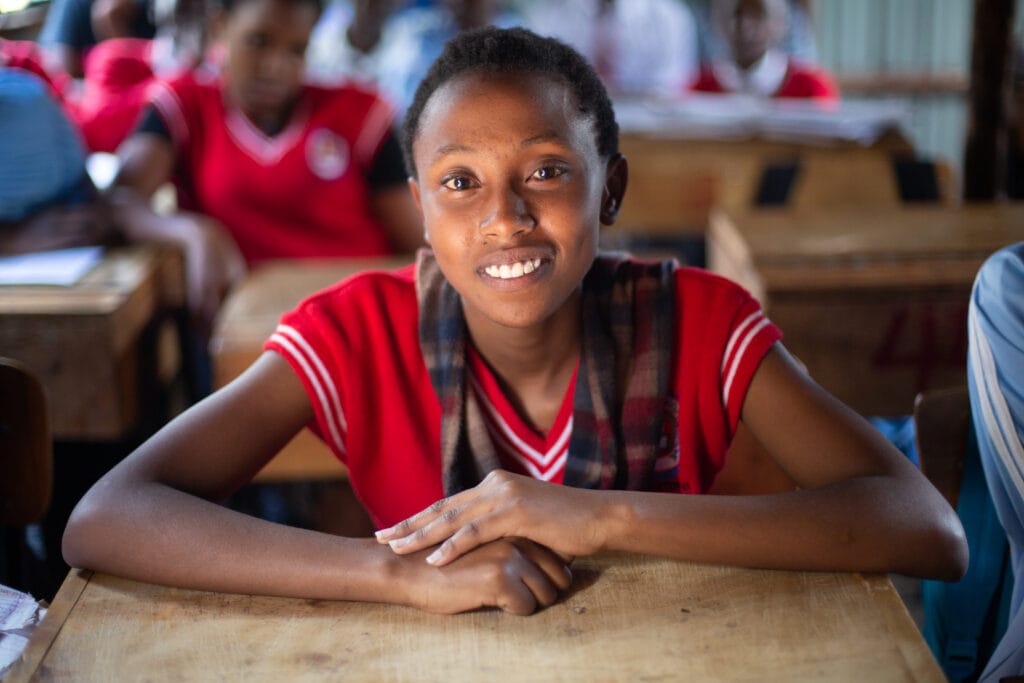Under the leadership of Commissioner Jutta Urpilainen, the current mandate of the European Commission has seen increased attention and support for education and TVET in the EU’s external action.
Political commitment and financial investment in quality, inclusive education are urgently needed. Indeed, although access to education has steadily improved over the last 20 years, the number of children and young people excluded from education is still a major concern. Even if they are in school, this does not necessarily mean that they have access to quality, inclusive learning; an estimated 70% of 10-year-olds are unable to read a simple text. (The State of Global Learning Poverty: 2022 Update)
Not all people are affected equally; gender, age, socio-economic status, migration status, disability and other factors are linked to societal barriers that determine the chances of accessing, participating and succeeding in education. Exclusion and discrimination are compounded when these factors intersect.
Therefore, we very much welcomed the establishment of the 10% sub-target for education in the EU’s development and cooperation budget. It is promising and reassuring that this commitment has been met, over the past two years.
Education has found a place as a key priority area in the Global Gateway, which has reframed the EU’s strategic approach to international partnerships, and “Education and Training” is a specific investment package for the EU-Africa Global Gateway. However, the Global Gateway’s focus on infrastructural investments risks side-lining support to education systems towards quality, equity, and inclusion.
The European Commission has used the outcomes of the Transforming Education Summit as a blueprint for its action in this field, ensuring consistency with global orientations and Sustainable Development Goal 4. Although the European Union does not have a specific strategy on education in external action, education has been integrated into relevant and connected policy frameworks: the European Consensus on Development, the EU Action Plan on Human Rights and Democracy, the EU Gender Action Plan III, the EU Strategy on the Rights of the Child, and the Youth Action Plan in EU external action.
As the institutional mandate comes to an end, we call for a strong legacy to keep education high on the agenda of the future Commission.
While recognising the positive steps taken over the last 4 years, some crucial issues need to be addressed to ensure that equity, quality and inclusion underpin the EU’s work in education. We therefore call on the current and future European Commission to:
- Ensure a focus on human development in the Global Gateway, with a human rights-based, gender-sensitive and inclusive approach, which is central to lifting people out of poverty and reducing inequalities. The Global Gateway and Team Europe Initiatives should aim to exceed the target of at least 20% of spending on human development, while strengthening cross-sectoral cooperation on education, TVET, health, social protection, shelter, nutrition and WASH.
- Engage civil society from Europe and in partner countries in a meaningful way through structured mechanisms and dialogues to ensure that cooperation promotes shared priorities and that flagship initiatives resonate with local realities. Dedicated funding opportunities for civil society organizations with resources to strengthen the capacity and involvement of local stakeholder, particularly those representing groups at risk of discrimination in education such as organizations of persons with disabilities, are essential to building resilient education systems that can withstand crises (due to conflict, the climate change, and disease outbreaks).
- Adopt a lifelong learning approach by supporting education from an early age and throughout the life course. While Technical and Vocational Education and Training (TVET) and higher education are crucial to acquire skills, promote inclusion and ensure better employment prospects, exclusion from education needs to be tackled as early as possible, starting in the pre-primary years and continuing through tertiary learning. This will reduce inequalities and ensure a coherent chain of opportunities throughout life.
- Adopt a twin-track approach to financing education, by supporting the strengthening of quality, inclusive education systems while providing targeted resources to address the learning needs of the most marginalized groups (women and girls, persons with disabilities, refugees and migrants, people belonging to ethnic, linguistic, or religious minorities, etc.).
- Establish and apply clear ethical standards and criteria for public-private partnerships (PPPs) in education to avoid the commodification of education services and safeguard child rights, equal access and opportunities for all, and the quality of teachers, education and curricula. As an alternative to PPPs, explore the possibility to establish multi-stakeholder partnerships, involving non-state and non-for-profit actors for capacity-building and support services. This type of arrangement could deliver results without undermining the core principles and the development of public education systems.
- Develop an external action implementation strategy and guidance for EU Delegations for its at least 10 % spending target on education and TVET, as requested by the European Parliament in its resolution of 13 December 2023 on EU development cooperation to enhance access to education and training in developing countries.
This call is endorsed by:
- ACT Alliance EU
- Africa Network Campaign on Education for All (ANCEFA)
- EU-CORD
- Finn Church Aid (FCA)
- Humanity & Inclusion – Handicap International
- Light for the World
- Plan International
- Save the Children
- World Vision EU Representation
